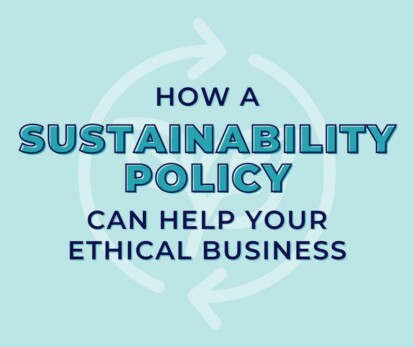10 Must-See Vegan Documentaries


Does your ethical business have a sustainability policy (sometimes known as a Sustainability Action Strategy)?
If it does, what does it include, and when was the last time you reviewed it? If it doesn’t, now might be the time to put a sustainability policy in place.
Harvard Business School says, “In business, sustainability refers to doing business without negatively impacting the environment, community, or society as a whole”. It also says that sustainability in business addresses two main categories:
Ideally, every business or organisation should have a sustainability policy, because it’s a commitment, both internal and external, to managing environmental and social impact in a positive way.
This is especially important for ethically driven businesses.
Having a strong sustainability policy is a clear statement about how and why you do business. This can help to attract ethical consumers who want to support companies that align with their values and will become loyal ambassadors.
In addition, a well-crafted sustainability policy can serve as a roadmap for aligning business practices with ethical and sustainable values.
It can encourage you to innovate more in order to find more sustainable solutions, which can lead to long-term growth and competitiveness, as well as ensure that you stay ahead of evolving regulations related to environmental and ethical practices.
You may also find that having a sustainability policy in the public domain attracts enquiries from other organisations and stakeholders who share similar values. This is a powerful way to form new partnerships and amplify the impact of your sustainability efforts.
While there isn’t a template for the perfect sustainability policy, a quick Google search for “sustainability policy template” will bring up some great starting points. This can be helpful if you find the thought of starting from a blank page slightly terrifying!
Many sustainability policies contain the following:
It’s a good idea to begin your vegan organisation’s sustainability policy with a clear and concise declaration of your commitment to sustainability. This should reflect the organisation’s values and set a tone for your approach to sustainable practices.
A word of warning here! Many businesses position their sustainability policy as an aspirational document, but this approach is problematic.
When sustainability is treated as solely aspirational, it becomes something to work towards in the future rather than being part of a business’s core operational mandate. People may feel that it’s all very well saying what you want to do in the future, but the question is, what are you doing now, and how will that affect the world long-term?
Yes, aspirations are great, but your sustainability policy should be firmly rooted in reality and woven into the fabric of how you source supplies, who you serve, your social impact, how you treat employees, the resources you use, and more.
Your sustainability policy should also define which areas of your organisation’s operations and activities it covers. In addition, highlight the purpose of the policy in guiding sustainable behaviour.
Many sustainability policies include a Guiding Principles section that outlines the fundamental principles and values that will guide the organisation’s sustainability efforts. These principles often encompass environmental protection, social responsibility, economic resilience, and ethical behaviour.
Think about the guiding principles that shape your business. These often relate to why you founded the business in the first place or the ethical initiatives you support.
The sustainability policy is the ideal place to set out specific, measurable, achievable, relevant, and time-bound (SMART) goals and objectives that your business aims to achieve through its sustainability initiatives.
If you’re not sure of your goals, you might want to use the United Nation’s 17 Sustainability Goals as a springboard for ideas.
Of course, these goals are incredibly broad, so you will want to distil them down to something that relates to your organisation. For example, if you take the Gender Equality goal as a starting point, you might want to talk about your goals to close the gender pay gap and positive actions you’re taking to make pay fair.
There’s a great blog from Green Bouy Consulting about setting sustainability goals as a small business.
The policy should also clarify the roles and responsibilities of individuals within your organisation who are responsible for implementing and monitoring sustainability practices. If people change roles, make sure you update the policy!
At this stage in the sustainability policy, you will want to think about the effect your business has (or plans to have) on the environment and how you are working to minimise its impact. This section may cover areas such as energy and water conservation, waste reduction, pollution prevention, and responsible resource management.
As with the goals, try to be specific. Wanting to reduce your energy usage is laudable, but how? What practical steps are you taking? What does energy reduction look like on a daily basis in your business?
As a vegan business, you might want to talk about the steps you’ve taken to source organic plant-based supplies or reduce your carbon footprint, or how you’re working to reduce consumption, create a closed loop system, minimise waste, or lower emissions.
As we mentioned at the start of this blog, sustainability is about more than minimising environmental impact. Social responsibility is integral too.
Your sustainability policy should highlight ways in which your ethical organisation is supporting and positively impacting its employees, communities, and other stakeholders. This may cover things such as fair labour practices, employee well-being and development, community engagement, working with local suppliers, supporting workers in the supply chain, charity activities, and diversity and inclusion.
When you run an ethical business that sells physical products or partners with other organisations in some way, it’s crucial to be confident about the ethical credentials of every link in your supply chain.
The sustainability policy is the ideal place to outline your organisation’s commitment to sourcing materials and products ethically, ensuring that suppliers adhere to social and environmental standards.
This is likely to be incredibly important to your audience, and a fantastic way to build trust. People will appreciate you having done the research into ethical suppliers so that they can feel confident about supporting your organisation.
As we mentioned above, businesses often fall into the trap of making their sustainability policies entirely aspirational. This can feel performative or leave them open to accusations of greenwashing.
You’ll need to be clear about how you plan to monitor your sustainability goals and report any progress, as well as being transparent about your efforts, achievements, and challenges. If something isn’t possible at the moment, let your audience know why and explain your next steps to explore other options.
You might also want to include a statement that commits to continuously assessing and improving your organisation’s sustainability practices based on feedback, changing circumstances, and new insights.
It’s advisable to have a section in your sustainability policy that acknowledges your company’s responsibility to comply with relevant laws, regulations, and standards related to sustainability and ethical business practices.
There are some inspirational examples of vegan brands that have implemented strong sustainability policies and experienced growth in reputation and impact as a result.
ReGrained focuses on upcycling spent grain from breweries to create nutritious snacks. Their sustainability policy centres around reducing food waste and promoting sustainable sourcing. This unique approach has garnered attention from consumers who are interested in innovative and eco-friendly products.
Gardein produces a range of vegan meat alternatives and is committed to sustainability. They have a policy that emphasises reducing their carbon footprint, using plant-based ingredients, and offering products that appeal to a variety of dietary needs. Their approach resonates with consumers seeking sustainable protein options.
Nutiva offers a range of organic and vegan food products, including coconut oil, hemp seeds, and superfoods. They prioritise organic farming practices and fair trade sourcing.
The company has a dedicated “Social Impact” section on their website, where it outlines its activities and publishes annual social and environmental reports.
As an ethical business, a sustainability policy is a powerful way to rally people to your cause. You can publicly highlight the positive impact you’re making and track its growth.
We hope we’ve given you some ideas to get started. You might also want to look at the sustainability reports of your favourite brands for inspiration.
Of course, this is simply a starting point. Your sustainability policy needs to be unique to your organisation and will depend on your purpose, audience, goals, stakeholders, industry, and more.
A strong sustainability policy can serve as a guiding document that aligns your organisation’s actions with its commitment to ethical, social, and environmental responsibility. This can help you to your reputation as an ethical business that acts with integrity and transparency.